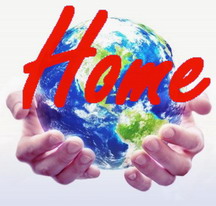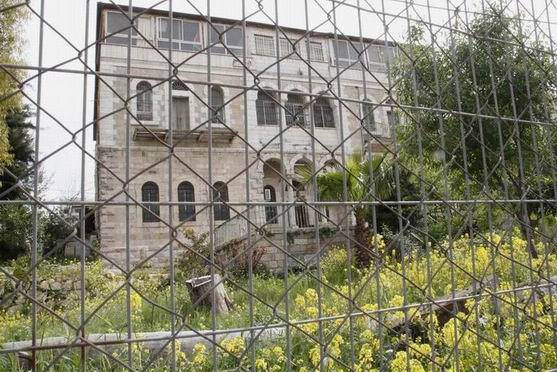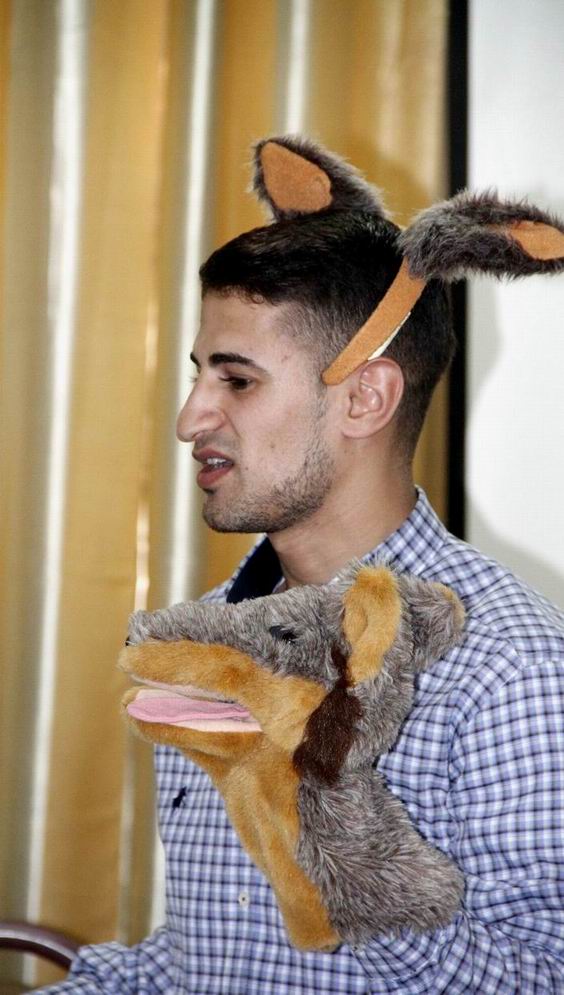Grandpa and Grandma in prison
by Sytse Tjallingii
Dar al Amal, Dar al Amal, House of Hope, with a heart for the boys to get them back on track
How is that: to stay in a 'prison'?
What is it like to wake up and know that there are armed guards around the building you stay and a high fence with barbed wire above it? How is it not to know what our fellow residents have done so that they have been handcuffed by the police on the orders of the judge?
Fortunately, we can get out again if we ask for it! It is an intense experience to spend eight days in the juvenile prison Dar Al Amal, which means "House of Hope"!
How did we end up in this juvenile prison?
Because of our son-in-law, who is an Israeli, but works in the Netherlands, we felt the need to meet his parents who live in Israel. When we were in Israel, we also wanted to visit the Palestinian Quakers in Ramallah. They have been a beautifully restored meeting house (Quaker church) for more than a hundred years in the heart of the busy city center of Ramallah in Palestine. The silence of the Quaker meetings and the testimonies in the meeting touched us deeply. In the visits that followed, we met Palestinians who worked for the AFSC (American Friends Service Committee, the American Quaker Aid Organization). They asked us to give a workshop non-violent communication for a group of young people with youth leaders from the AFSC youth program in Palestine.
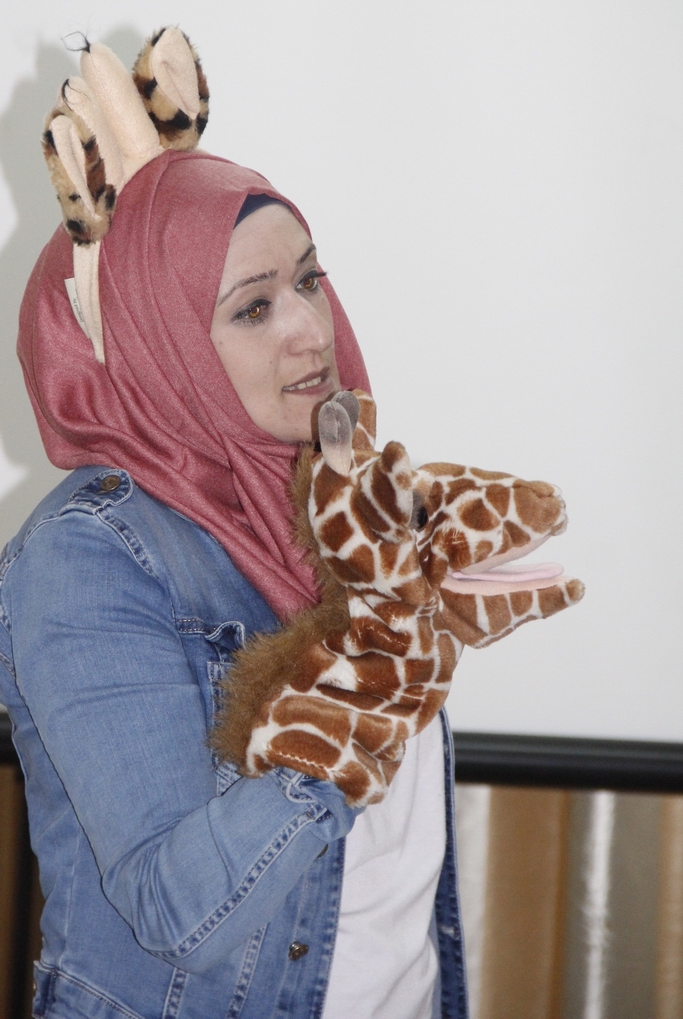
Left: Sondos student in our course from Oct. 2017 demonstrates the giraffe language Right: Abdelrachman, lawyer also follows our courses demonstrates the jakhal language.
What do we train in our communication courses?
At subsequent visits they asked us to give communication courses in Ramallah. We do this with techniques from NLP (Neuro Linguistic Programming), a set of mental techniques to choose more consciously, build your self-confidence, move better in the other person and above all learn to get respect for the world model of the different and that of yourself. Nonviolent communication with giraffe language and jackal language, according to the Marshall Rosenberg method. We have seen in the Quaker meeting house how well young people can show in a role-play what offensive and communicative communication is. This is the core of non-violent communication, which we deepen with the youth leaders. We enjoy seeing how enthusiastic the participants are, so we also do this work for our own pleasure! We have given our four courses and an exam after the fourth course in Ramallah and in Gaza.
What is it like to be in Israel and Palestine?
Although it is easy for us to be there for a few weeks, because we know that we can go back to the Netherlands, there are still many emotions in our memory. We have written 2014 in the Friends Circle about our experiences in Gaza. We still get messages from our students, we feel connected to them: Gaza is a large prison that is occasionally taken under missile fire, giving extreme groups their chance.
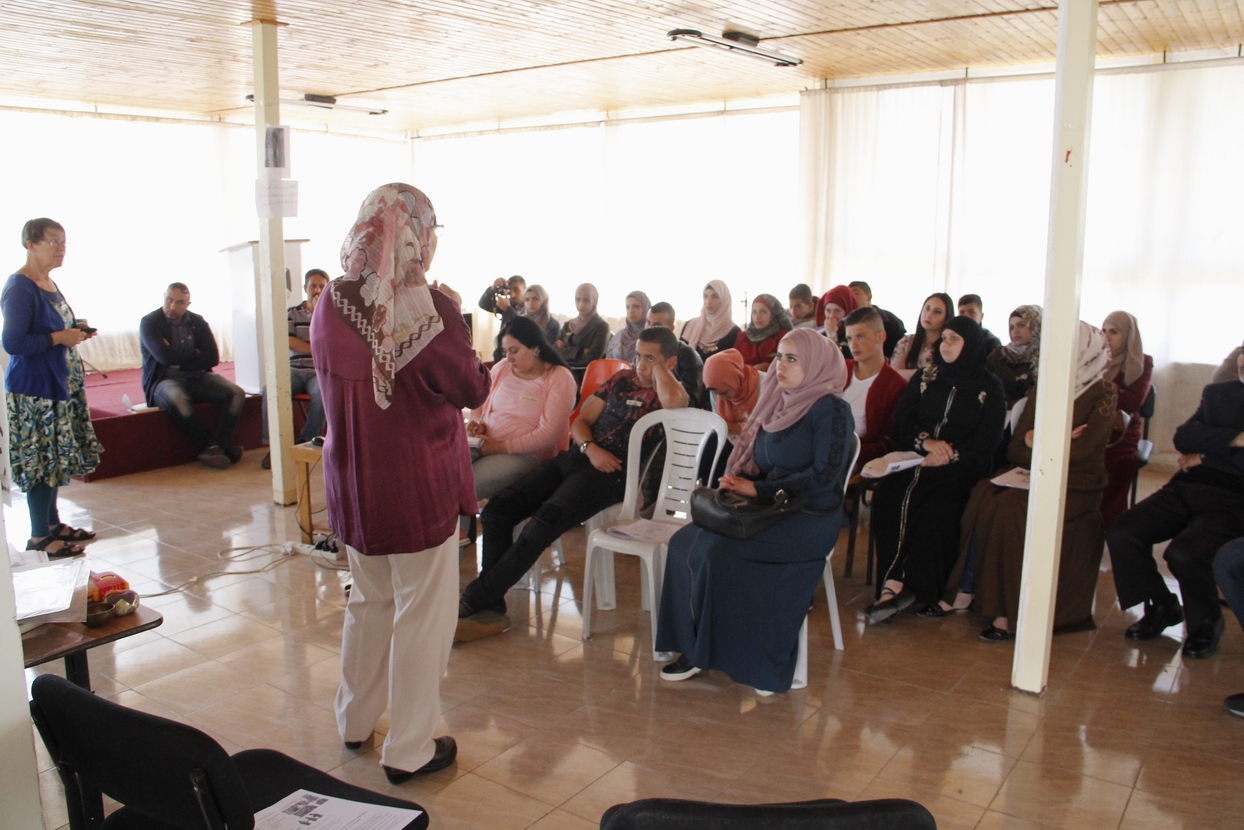
What can a local trainer do?
Our organizer and translator is Hekmat Bessiso, she worked for a long time as a secretary for the Quakers in Ramallah. Our work is thus closely related to that of the Quakers. Hekmat also works as a volunteer in the juvenile prison. She asked us 2 years ago whether we would like to give a course NLP and non-violent communication in Dar al Amal. Basel the director would like to open the house to new activities and improve the quality of the volunteers and staff. For a full NLP Practitioner, there are four five-day courses that we complete with an exam. The last three times we also slept in Dar al Amal in a good bed and in the morning delicious Arabic coffee with our own well-kept breakfast!
.
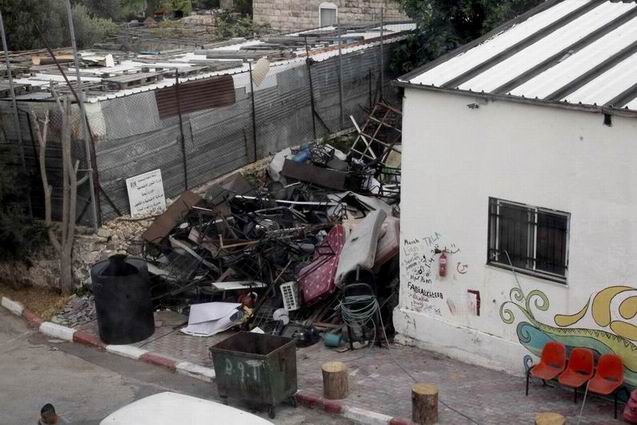
Above: April 2017 at our previous course, in the garden a big pile of rubbish. Below: Oct 2017 same place: everything is cleaned up, there is now a vegetable garden made.
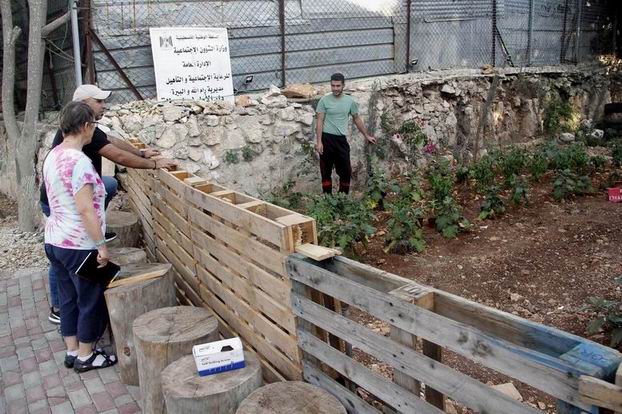
Boven: April 2017 bij onze vorige cursus, in de tuin een grote berg rommel. Onder: Okt 2017 zelfde plek: alles is opgeruimd, er is nu een groentetuin gemaakt.
What do we see for progress?
There is a large group of volunteers who do a lot of work in Dar al Amal, both in teaching the boys who are there to rehabilitate and to maintain the old building. In the morning for the work it is very busy in the hall at the front door. There is coffee drunk and unfortunately also a lot of smoking, although this was less in October than in our previous courses. There is a lot of laughter and it is fun.
The director, Basel, goes to work, but the others sometimes still sit and talk for a while. Basel is very good at making contact, really an emotional person. Great what he accomplishes! In the first place, he knows how to get the boys back on track in one way or another: going back to school, getting a job and sometimes returning to family again. But in the second pla
But in the second place he knows how to involve the neighborhood in the 'house of hope'. One of the co-workers, who is from Gaza and can not return, lives in the House of Hope. His wedding was in the field of the juvenile prison just after our departure. The boys helped with cooking and decorating. There are already more weddings planned, so that opens up new perspectives
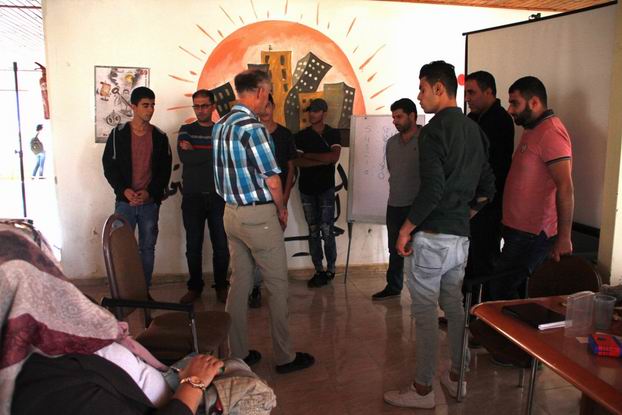
Sytse asks the men: How canyou prevent violence?
Workshop with teachers and students psychology, law and social work.
Basel also organized the workshop that we gave to 37 people on Sunday afternoon, mostly teachers and students social work, law and psychology at the university. There were also some mentors from secondary schools, who were very enthusiastic about what we did. What we do is very practical with a minimum of theory, which at one point made one of the students ask for more 'depth'. They are used to a lot of theory, but they often come to our courses to learn practical skills.
The workshop was to our surprise announced as 'The best practices to combat violence in the community'. In the workshop we first do an exercise to make everyone aware of the differences in images that everyone has with violence. It immediately gives us a good insight into what lives in Palestine. And that is not only directly linked to the occupation, although it will certainly also have an indirect influence on it. The boys in the juvenile prison often come from neighborhoods of the cities and villages. One of the striking messages we hear is that there are relatively many boys from the village of Salfit. We visited one of our students three years ago. The pressure of the large Israeli settlement Ariel, in the middle of Palestinian territory, is intense. The village has lost a lot of its land with olive trees to the settlement and that is a lot of unemployment and dissatisfaction. Nevertheless, it is important to make the participants aware of what they can do to stop violence themselves. We therefore asked the backgrounds of one of the boys who stayed in the juvenile prison and took this as a practice model in the workshop.
Of course we have changed recognizable details
and names, so that privacy remains guaranteed.
We do not know the history at that moment, but Omar, a boy who lives nearby,
has scolded Ali's sister for whore on Twitter. Ali took a knife and went
to Omar and stabbed him, he just survived. Ali is now in prison and there
are big problems with his future.
After we have explained this example, I call all
men forward and indicate to form a circle around me. I call "I am
Ali and I want to kill Omar with a knife". Then I ask "What
are you doing to prevent Ali from doing this?" It takes a while before
they realize what influence they have, but then I already feel that some
people take my shoulders and stand in front of me to stop me. In this
way, they all feel the energy it gives to combat violence. Especially
the mentors of secondary schools are very enthusiastic about this exercise.
They see in practice how they can apply this.
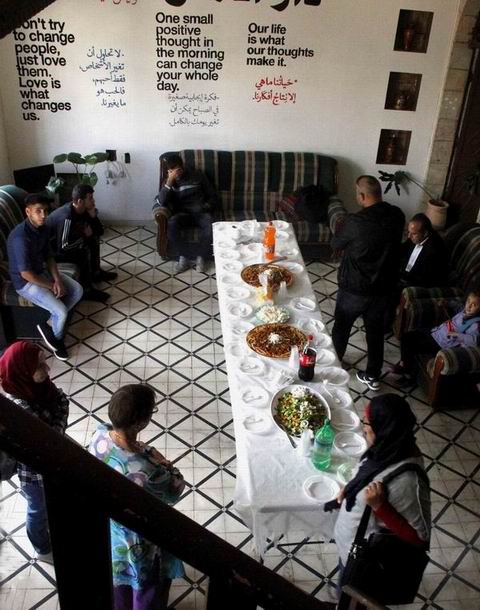
After the course we eat in the hall with the boys,
the staff and the participants of our course.
On the wall: Do not try to change people, just love them, love is what
changes us. (Do not try to change people, love them, Love changes us.)
After seven days of a workshop, a five-day course and an exam, we set out for Jerusalem, Bethlehem and Tel Aviv, full of good and penetrating experiences!
